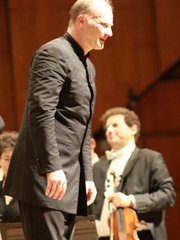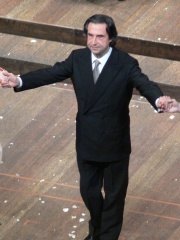
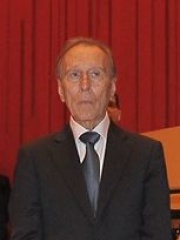
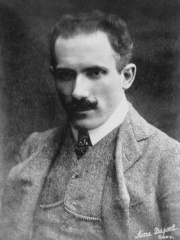
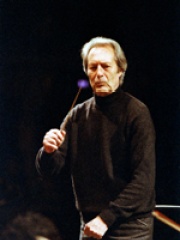
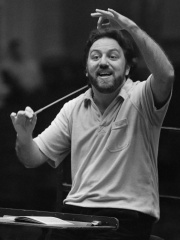
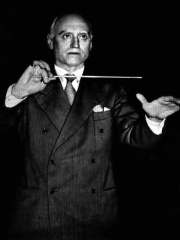
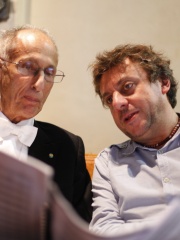
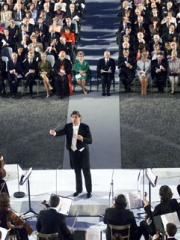
The Most Famous
CONDUCTORS from Italy
This page contains a list of the greatest Italian Conductors. The pantheon dataset contains 128 Conductors, 11 of which were born in Italy. This makes Italy the birth place of the 4th most number of Conductors behind Germany, and Russia.
Top 10
The following people are considered by Pantheon to be the top 10 most legendary Italian Conductors of all time. This list of famous Italian Conductors is sorted by HPI (Historical Popularity Index), a metric that aggregates information on a biography's online popularity. Visit the rankings page to view the entire list of Italian Conductors.

1. Riccardo Muti (b. 1941)
With an HPI of 76.76, Riccardo Muti is the most famous Italian Conductor. His biography has been translated into 37 different languages on wikipedia.
Riccardo Muti (Italian: [rikˈkardo ˈmuːti]; born 28 July 1941) is an Italian conductor. He is current music director of the Orchestra Giovanile Luigi Cherubini. Muti has previously held posts at the Maggio Musicale in Florence, the Philharmonia Orchestra in London, the Philadelphia Orchestra, the Teatro alla Scala in Milan, the Salzburg Whitsun Festival, and the Chicago Symphony Orchestra. He was named music director emeritus in Chicago in 2023. A prolific recording artist, Muti has received numerous honours and awards, including two Grammy Awards. He is especially associated with the music of Giuseppe Verdi. Among the world's leading conductors, in a 2015 Bachtrack poll he was ranked by music critics as the world's fifth best living conductor.

2. Claudio Abbado (1933 - 2014)
With an HPI of 76.41, Claudio Abbado is the 2nd most famous Italian Conductor. His biography has been translated into 60 different languages.
Claudio Abbado (Italian pronunciation: [ˈklaudjo abˈbaːdo]; 26 June 1933 – 20 January 2014) was an Italian conductor who was one of the leading conductors of his generation. He served as music director of the La Scala opera house in Milan, principal conductor of the Berlin Philharmonic, principal conductor of the London Symphony Orchestra, principal guest conductor of the Chicago Symphony Orchestra, music director of the Vienna State Opera, founder and director of the Lucerne Festival Orchestra, founder and director of the Mahler Chamber Orchestra, founding artistic director of the Orchestra Mozart and music director of the European Union Youth Orchestra. He was recipient of the Ernst von Siemens Music Prize and Senator for life in Italy.

3. Arturo Toscanini (1867 - 1957)
With an HPI of 74.70, Arturo Toscanini is the 3rd most famous Italian Conductor. His biography has been translated into 58 different languages.
Arturo Toscanini (; Italian: [arˈtuːro toskaˈniːni]; March 25, 1867 – January 16, 1957) was an Italian conductor. He was one of the most acclaimed and influential musicians of the late 19th and early 20th century, renowned for his intensity, his perfectionism, his ear for orchestral detail and sonority, and his eidetic memory. He was at various times the music director of La Scala in Milan and the New York Philharmonic. Later in his career, he was appointed the first music director of the NBC Symphony Orchestra (1937–1954), and this led to his becoming a household name, especially in the United States, through his radio and television broadcasts and many recordings of the operatic and symphonic repertoire.

4. Carlo Maria Giulini (1914 - 2005)
With an HPI of 66.30, Carlo Maria Giulini is the 4th most famous Italian Conductor. His biography has been translated into 26 different languages.
Carlo Maria Giulini (Italian pronunciation: [ˈkarlo maˈriːa dʒuˈliːni]; 9 May 1914 – 14 June 2005) was an Italian conductor. From the age of five, when he began to play the violin, Giulini's musical education was expanded when he began to study at Italy's foremost conservatory, the Conservatorio Santa Cecilia in Rome at the age of 16. Initially, he studied the viola and conducting; then, following an audition, he won a place in the Orchestra dell'Accademia Nazionale di Santa Cecilia. Although he won a conducting competition two years later, he was unable to take advantage of the prize, which was the opportunity to conduct, because of being forced to join the army during World War II despite being a pacifist. As the war was ending, he hid until the liberation to avoid continuing to fight alongside the Germans. While in hiding, he married his girlfriend, Marcella, and they remained together until her death in 1995. Together, they had three children. After the 1944 liberation, he was invited to lead what was then known as the Augusteo Orchestra (now the Santa Cecilia Orchestra) in its first post-Fascist concert, and quickly other conducting opportunities came along. These included some of the world's major orchestras including the Chicago Symphony Orchestra, London's Philharmonia Orchestra, the Los Angeles Philharmonic and the Vienna Philharmonic. His career spanned 54 years with retirement coming in 1998. He died in Brescia, Italy, at 91 years of age.
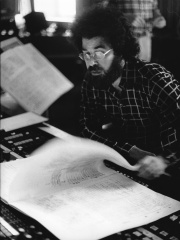
5. Giuseppe Sinopoli (1946 - 2001)
With an HPI of 64.34, Giuseppe Sinopoli is the 5th most famous Italian Conductor. His biography has been translated into 27 different languages.
Giuseppe Sinopoli (Italian pronunciation: [dʒuˈzɛppe siˈnɔːpoli]; 2 November 1946 – 20 April 2001) was an Italian conductor and composer.

6. Riccardo Chailly (b. 1953)
With an HPI of 63.32, Riccardo Chailly is the 6th most famous Italian Conductor. His biography has been translated into 21 different languages.
Riccardo Chailly (Italian pronunciation: [rikˈkardo ʃʃaˈ(j)i], French: [ʃɑji]; born 20 February 1953) is an Italian conductor. He is currently music director of the Lucerne Festival Orchestra and of La Scala. Prior to this, he held chief conducting positions at the Gewandhausorchester (2005–2016); the Royal Concertgebouw Orchestra (1988–2004); the Berlin Radio Symphony Orchestra (1982–1988); and the Teatro Comunale of Bologna (1986–1993). He was also the first musical director of the Orchestra Sinfonica di Milano Giuseppe Verdi (1999–2005) and principal guest conductor of the London Philharmonic Orchestra (1983–1986). Born in Milan, Chailly first studied composition with his father, Luciano Chailly, in his youth. He continued with composition at the conservatories in Milan and Perugia, but later shifted to conducting under Piero Guarino and Franco Ferrara. He made his conducting debut at La Scala in 1978 with Massenet's Werther, where he had been assistant director to Claudio Abbado since 1973. Upon becoming principal conductor at the Royal Concertgebouw Orchestra, he embarked on performing standard symphonic works—particularly Bruckner and Mahler—but expanded the orchestra's previously minuscule 20th century and contemporary repertoire. For 30 years, Chailly has recorded exclusively with Decca.

7. Victor de Sabata (1892 - 1967)
With an HPI of 60.30, Victor de Sabata is the 7th most famous Italian Conductor. His biography has been translated into 18 different languages.
Victor Alberto de Sabata (10 April 1892 – 11 December 1967) was an Italian conductor and composer. He is widely recognized as one of the most distinguished operatic conductors of the twentieth century, especially for his Verdi, Puccini and Wagner. De Sabata was acclaimed for his interpretations of orchestral music. Like his near contemporary Wilhelm Furtwängler, de Sabata regarded composition as more important than conducting but achieved more lasting recognition for his conducting than his compositions. De Sabata has been praised by various authors and critics as a rival to Toscanini for the title of greatest Italian conductor of the twentieth century, and even as "perhaps the greatest conductor in the world". In 1918, aged 26, de Sabata was appointed conductor of the Monte Carlo Opera, performing a wide variety of late-19th century and contemporary works, and earning acclaim from Maurice Ravel. De Sabata became the music director at La Scala in Milan, a post he would hold for over 20 years. His animated conducting style led one observer to describe his appearance in performance as "a cross between Julius Caesar and Satan." Following World War II, his career expanded internationally. He was a frequent guest conductor in London, New York and other American cities. His post-war operatic work included celebrated collaborations with Maria Callas and Renata Tebaldi, most notably his famous recording of Tosca with Callas in 1953. His career was cut short by a heart attack that same year.

8. Claudio Scimone (1934 - 2018)
With an HPI of 57.86, Claudio Scimone is the 8th most famous Italian Conductor. Her biography has been translated into 16 different languages.
Claudio Scimone (23 December 1934 – 6 September 2018) was an Italian conductor. He was born in Padua, Italy and studied conducting with Dimitri Mitropoulos and Franco Ferrara. He established an international reputation as a conductor, as well as a composer. He revived many baroque and renaissance works. His discography includes over 150 titles, and he won numerous prizes, including the Grand Prix du Disque of the Académie Charles Cros. Claudio Scimone was the founder of I Solisti Veneti (the ensemble with which most of his recordings were made) and at the time of his death was the honorary conductor of the Gulbenkian Orchestra in Lisbon, Portugal. With the Philharmonia of London, he conducted the first recording of Muzio Clementi’s Symphonies. Scimone led the world to discover the importance of Vivaldi's theatrical works, beginning with the first modern performance of Orlando furioso, featuring Marilyn Horne and Victoria de Los Angeles. In the reborn Fenice Claudio Scimone directed the first modern revival of the Venetian version of Maometto secondo by Rossini. He also gave the modern premieres of Moses in Egypt and Oedipus at Colonus by Rossini, and The Last Judgement by Salieri. Claudio Scimone was awarded the title of Knight Grand Cross of the Order of Merit of the Italian Republic (the highest ranking honour of the Republic). He was also awarded an honorary law degree from the University of Padua.

9. Daniele Gatti (b. 1961)
With an HPI of 57.40, Daniele Gatti is the 9th most famous Italian Conductor. His biography has been translated into 18 different languages.
Daniele Gatti (born 6 November 1961) is an Italian conductor. He is currently chief conductor of Maggio Musicale Fiorentino, artistic advisor of the Mahler Chamber Orchestra, music director of the Orchestra Mozart and chief conductor of the Staatskapelle Dresden.
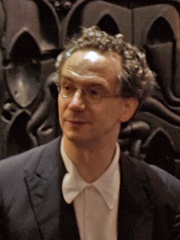
10. Fabio Luisi (b. 1959)
With an HPI of 55.88, Fabio Luisi is the 10th most famous Italian Conductor. His biography has been translated into 16 different languages.
Fabio Luisi (born 17 January 1959) is an Italian conductor. He is currently principal conductor of the Danish National Symphony Orchestra, music director of the Dallas Symphony Orchestra, and chief conductor of the NHK Symphony Orchestra.
People
Pantheon has 11 people classified as Italian conductors born between 1867 and 1964. Of these 11, 5 (45.45%) of them are still alive today. The most famous living Italian conductors include Riccardo Muti, Riccardo Chailly, and Daniele Gatti. The most famous deceased Italian conductors include Claudio Abbado, Arturo Toscanini, and Carlo Maria Giulini. As of April 2024, 1 new Italian conductors have been added to Pantheon including Gianandrea Noseda.
Living Italian Conductors
Go to all RankingsRiccardo Muti
1941 - Present
HPI: 76.76
Riccardo Chailly
1953 - Present
HPI: 63.32
Daniele Gatti
1961 - Present
HPI: 57.40
Fabio Luisi
1959 - Present
HPI: 55.88
Gianandrea Noseda
1964 - Present
HPI: 47.58
Deceased Italian Conductors
Go to all RankingsClaudio Abbado
1933 - 2014
HPI: 76.41
Arturo Toscanini
1867 - 1957
HPI: 74.70
Carlo Maria Giulini
1914 - 2005
HPI: 66.30
Giuseppe Sinopoli
1946 - 2001
HPI: 64.34
Victor de Sabata
1892 - 1967
HPI: 60.30
Claudio Scimone
1934 - 2018
HPI: 57.86
Newly Added Italian Conductors (2025)
Go to all RankingsOverlapping Lives
Which Conductors were alive at the same time? This visualization shows the lifespans of the 6 most globally memorable Conductors since 1700.

